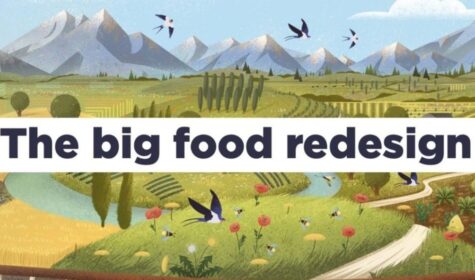We are really pleased to be supporting the launch of the Ellen MacArthur Foundation’s ‘Big Food Redesign’ report, exploring the potential for global companies to support the transition to a ‘circular design for food’ – in other words, production systems which are diverse in nature, recycle nutrients and waste and contribute positively to climate, nature and health.
The report recognises that not all food is the same – the type of farming systems used to produce it can make an enormous difference to its overall impact. In particular, regenerative agriculture and practices such as agroforestry, cover cropping and the introduction of herbal leys grazed by livestock to promote soil fertility, are all part of the change we need to see.
To enable this change, the report makes a number of recommendations for businesses:
- Create ambitious and well-resourced action plans to make nature-positive product portfolios a reality.
- Create a new collaborative dynamic with farmers.
- Develop iconic products to showcase the potential of circular design for food.
- Contribute to and use common on-farm metrics and definitions, highlighting the work of the Global Farm Metric.
- Advocate for policies that support a nature-positive food system.
The Foundation actively encourages food brands and supermarkets to get involved and ‘move beyond “better” sourcing of current ingredients, and instead redesign their product portfolios’. This means reconsidering the ingredients they use and how they are produced, in order to deliver options that are better for customers, farmers and the wider environment.
The Foundation’s report sets out four key principles for food brands and supermarkets:
- Diverse ingredients – Only four crops produce 60% of the planet’s calories. We need to increase diversity both in crops and livestock, which will build food supply resilience.
- Lower impact ingredients – Sourcing products that are less harmful to the environment and encouraging ‘quick wins’ by moving from conventionally produced animal products to lower impact options.
- Upcycled ingredients – Providing the opportunity to reduce the amount of food wastage per year and lessen pressure on the land– a third of food is lost or wasted.
- Regeneratively produced ingredients – This will lead to greater yields and farmer profitability, whilst providing climate and biodiversity benefits.
‘Leading food brands and supermarkets have substantial influence on the food system: in the EU and UK, for example, 40% of agricultural land supplies ingredients to the top 10 food brands and supermarkets. Many of these players are currently part of the problem, but given their size and influence they can be, and need to be, part of the solution.’ – ‘The Big Food Redesign’ report
The Foundation will have launch events to raise awareness of the study:
- The Circular Economy Show (28th September 2021) will broadcast a special edition of the show featuring the Foundation.
- COP26 (31st Oct-12th November 2021) The Foundation will be hosting two events: a film screening and panel discussion at the IMAX theatre at the Glasgow Science Centre, and the New York Times Climate Hub has invited the Foundation to host a circular economy café.
Dame Ellen MacArthur, the Foundation’s founder, said: ‘Just like the clothes we wear and the products we rely on every day, our food is designed. Food businesses steer our choices on what we eat. From the beginning, they make decisions about how it tastes, how it looks and how good it is for us – and how it impacts nature. This means food businesses have an enormous opportunity to make nature-positive food mainstream.’


